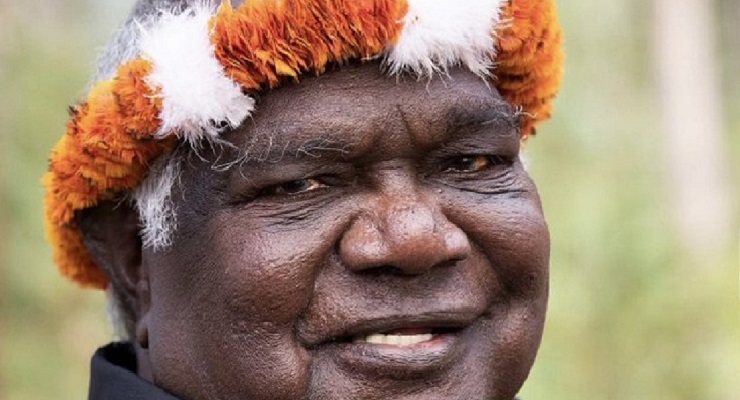
Note to Aboriginal and Torres Strait Islander readers: this story includes the name and image of a deceased Indigenous person. Yunupingu’s last name is used in accordance with his family’s wishes.
Indigenous leader Yunupingu died today, aged 74, in his Northern Territory homeland.
The Yolŋu Elder and Gumatj clan leader was one of Australia’s most revered Indigenous leaders and will be remembered as a “master of ceremonies”, a “keeper of songlines” and a lifelong champion of Aboriginal and Torres Strait Islander peoples and rights whose influence reached all corners of the country.
“He was one of the greatest of Australians,” Prime Minister Anthony Albanese told ABC’s RN Breakfast when he learned (mid-interview) of his death.
“An extraordinary leader of his people, respected right across Indigenous and non-Indigenous Australia.”
Yunupingu was a leader in the campaign for constitutional recognition of Indigenous peoples and stood on the advisory group for an Indigenous Voice to Parliament.
Yunupingu’s legacy is rooted in the Aboriginal Land Rights movement, but as the Yothu Yindi Foundation (that Yunupingu helped establish in 1993) writes: “His name is synonymous with some of the nation’s most significant events — the Yirrkala Bark Petitions, the Gove Land Rights case, the Land Rights Act, the Barunga Statement, the Native Title Act and the Voice.”
He engaged prime ministers (Malcolm Fraser, Bob Hawke, Kevin Rudd, Julia Gillard, Tony Abbott and Malcolm Turnbull) and in 1978 was named Australian of the Year. He also took home an Order of Australia medal in 1985. He negotiated for Indigenous peoples to have authority and power over their own knowledge, land and rights.
Despite his influence, the foundation described him as “first and foremost a leader of his people, whose welfare was his most pressing concern and responsibility”.
Albanese told RN that Yunupingu “showed the way”, recounting a conversation the two had at Garma Festival in 2022. Yunupingu asked “Are you serious?” about a referendum. “I said to him that I was serious, that we would do it,” the prime minister said.
The prime minister also posted to Twitter a photo of himself with Yunupingu at last year’s Garma (Yunupingu founded the festival in 1999), calling him a “leader, a statesman, a great Yolngu man and a great Australian”.
“Yunupingu walked in two worlds with authority, power and grace, and he worked to make them whole — together,” tweeted Albanese.
“He now walks in another place, but he has left such great footsteps for us to follow in this one.”
Minister for Indigenous Australians Linda Burney paid her tributes to Yunupingu, tweeting that “Australia has lost a giant”. She recalled some of Yunupingu’s own words on the responsibility of all Australian people “to show leadership on reconciliation, recognition, and referendum”.
“In his final months Yunupingu reminded us: ‘the future is our responsibility’,” Burney wrote.
“His gifts to us as a nation was a life of truth-telling and a passionate belief in his people and in Australia, and we as a nation can gift to him a successful referendum later this year.”
Senator Patrick Dodson called Yunupingu’s legacy “immeasurable” and enduring.
“He weathered tempestuous engagements with good humour, and was always prepared to defend customary law and the rights of traditional owners,” the senator wrote in a statement on Twitter.
Yunupingu spent his whole life in Yirrkala and Gunyaŋara with his people.
As his daughter, Binmila Yunupingu, wrote: “Yunupingu lived his entire life on his land, surrounded by the sound of bilma (clapsticks), yidaki (didgeridoo) and the manikay (sacred song) and dhulang (sacred designs) of our people. He was born on our land, he lived all his life on our land and he died on our land secure in the knowledge that his life’s work was secure.”








If half our politicians were one tenth of this man the country would be in great shape!!
Sad news. He was an absolute legend and a man to admire.
Very sad he has gone ahead. But there are many, many more like him ready to step up.